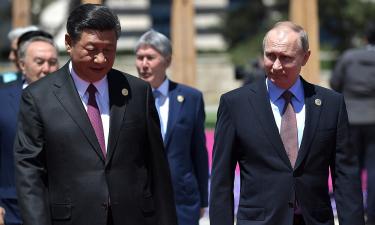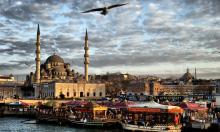Lukashenko makes Lithuania very nervous
The Lithuanian Poles are determined to prevent the construction of refugee camps for migrants in their villages. They are extremely concerned with the foreign policy line of the Lithuanian authorities in this direction. Construction companies refuse to build a wall with Belarus.
Manna from heaven: 40,000 migrants for Lithuania
Lithuania, which is intolerant to foreigners in general, was horrified by the arrival of 3,000 migrants, whom the country seems to be unable to dispose of. The head of the Lithuanian State Border Guard Service, Rustam Lyubaev, believes that Lithuania would be eventually forced to build a 40,000-strong camp for migrants.
It goes about migrants from Belarus, i. e. they are the migrants that Lithuania has to welcome and is unable to hand over to any other country within the EU. If they were EU-quota migrants, then Lithuania could refuse from them and hand them over to someone else.
Lithuania has already declared a state of emergency in border areas. Lithuanian officials believe that the increase in migration flows comes as a consequence of the policy of the Belarusian authorities.
Maybe it is true, because migrants do not go to Latvia or Poland — they go to Lithuania.
This could be another successful trick of the Belarusian administration. President of Belarus Lukashenko has endowed Lithuania with a prospect of major protests.
The Lithuanian Poles actively protest against migrants
The situation is especially intense in the Shalchininkai region, which is primarily populated by the Poles.
In the 500-strong village of Deveniškės, they are already on duty day and night, guarding the former local vocational school, where as many as 1,500 migrants are to be accommodated.
On Sunday, July 25, protesters from Deveniškės gathered in Vilnius near the Government House.
"For some reason, our government is looking for ways where and how to accommodate them (migrants), populate our territories and force us to live side by side with them, but the government does not protect us at all. You have no idea how scary it is when you go out in the morning and do not know maybe there is someone in the building. Sometimes one can see up to a dozen people walking in the fields. We live three kilometers from the border," one of the activists said at the rally.
In a town of the Rudninkai region, locals also gather every day at the adjacent landfill, thereby expressing dissatisfaction with the plans to accommodate 1,500 migrants there. On Monday, July 26, people tried to prevent the entry of state services into the landfill. Law-enforcers had to force the protesters out from the blocked road.
Lithuanian Prime Minister Ingrida Šimonytė said that controversy over the accommodation of migrants in the Šalčininkai district are was fuelled deliberately. She blamed MEP Valdemar Tomaševski of the Union of Christian Families of Lithuania and Poland (LLRA-KŠS) for flaming up the tensions. Representatives of this party are members of the Shalchininkai self-government.
Lithuanian government provokes Poles
Tomaszewski rejected the criticism, 15min.lt website said.
"It was a spontaneous action. One can understand people, their despair when no one talks to them. This is a good thing, and this is how civil society should work. We do not live in the countries that are often criticized for not contributing to the development of civil society. We must encourage this," the official said.
Tomaševski suggested Prime Minister Šimonytė should go to Šalčininkai and try to persuade the local authorities to accommodate the migrants in a landfill or in a former prison.
However, in connection with the situation in Deveniškės, he spoke strongly against migrants in the former vocational school.
"A lot of laws have been violated, including our international obligations, such as the European Charter of Self-Government, the interests of the local community have been violated too. This is definitely a provocation. We will definitely do our best to protect people," he said.
It is about time Lithuania should change its foreign policy
The politician also cracked down on the tough position of the Lithuanian authorities in relation to Belarus.
"We need to change our foreign policy, we need to start talking with our neighbor Belarus. We should have started that a long time ago, because we must talk to our neighbors, we should not burn bridges," the head of LLRA-KŠS said.
On Thursday, July 29, President Gitanas Nauseda summoned parliamentary and government leaders to discuss the migration crisis. The participants of the meeting came to conclusion that they would not change Lithuania's foreign policy towards Belarus. According to Prime Minister Šimonytė, the police should not waste their time talking to people who want to arrange protest in uncivilized ways.
On July 26, the local administration of former Verebeyskaya School in Alytus district reported that the migrants refused from food and demanded to be released from the camp.
Residents of the town of Kapchamestis in the Lazdija municipality were shocked by the behavior of migrants.
The policy of the Lithuanian administration raises concerns not only among the population, but also among businesses. Lithuanian companies already expressed their concerns about inadequate suggestions to build a wall on the border for free.
"A large number of companies participating in public procurement can not make a financial contribution to the construction of such a wall for nothing. Construction companies incur losses, so they can no longer sponsor the construction of the wall today. This must be provided at the expense of public funds," Dalius Gedvilas, Chairman of the Builders Association and Vice President of the Confederation of Industrialists told 15min. lt website.
Tomas Grenčevičius, the head of Satus Baltic, said that it was easy to offer, but very hard to implement. He said he did not know any single construction company that "would be eager to build a wall."
Subscribe to Pravda.Ru Telegram channel, Facebook, RSS!




